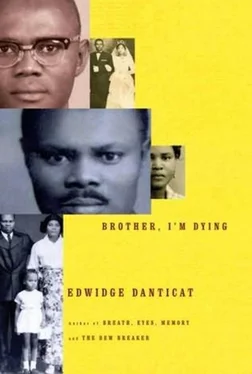Along with this task came a few minutes of preparation for the reading and thus a few intimate moments with my father’s letters, not only the words and phrases, which did not vary greatly from month to month, but the vowels and syllables, their tilts and slants, which did. Because he wrote so little, I would try to guess his thoughts and moods from the dotting of his i’ s and the crossing of his t’ s, from whether there were actual periods at the ends of his sentences or just faint dots where the tip of his pen had simply landed. Did commas split his streamlined phrases, or were they staccato, like someone speaking too rapidly, out of breath?
For the family readings, I recited my father’s letters in a monotone, honoring what I interpreted as a secret between us, that the impersonal style of his letters was due as much to his lack of faith in words and their ability to accurately reproduce his emotions as to his caution with Bob’s and my feelings, avoiding too-happy news that might add to the anguish of separation, too-sad news that might worry us, and any hint of judgment or disapproval for my aunt and uncle, which they could have interpreted as suggestions that they were mistreating us. The dispassionate letters were his way of avoiding a minefield, one he could have set off from a distance without being able to comfort the victims.
Given all this anxiety, I’m amazed my father wrote at all. The regularity, the consistency of his correspondence now feels like an act of valor. In contrast, my replies, though less routine-Uncle Joseph did most of the writing-were both painstakingly upbeat and suppliant. In my letters, I bragged about my good grades and requested, as a reward for them, an American doll at Christmas, a typewriter or sewing machine for my birthday, a pair of “real” gold earrings for Easter. But the things I truly wanted I was afraid to ask for, like when I would finally see him and my mother again. However, since my uncle read and corrected all my letters for faulty grammar and spelling, I wrote for his eyes more than my father’s, hoping that even after the vigorous editing, my father would still decode the longing in my childish cursive slopes and arches, which were so much like his own.
The words that both my father and I wanted to exchange we never did. These letters were not approved, in his case by him, in my case by my uncle. No matter what the reason, we have always been equally paralyzed by the fear of breaking each other’s heart. This is why I could never ask the question Bob did. I also could never tell my father that I’d learned from the doctor that he was dying. Even when they mattered less, there were things he and I were too afraid to say.
A few days after the family meeting, my father called my uncle Joseph in Haiti, to see how he was doing. It was Thursday, July 15, 2004, the fifty-first birthday of Jean-Bertrand Aristide, Haiti’s twice-elected and twice-deposed president. Having been removed from power in February 2004 through a joint political action by France, Canada and the United States, Aristide was now spending his birthday in exile in South Africa. However, the residents of Bel Air, the neighborhood where I grew up and where my uncle Joseph still lived, had not forgotten him. Joining other Aristide supporters, they’d marched, nearly three thousand of them, through the Haitian capital to call for his return. The march had been mostly peaceful, except that, according to the television news reports that my father and I had watched together that evening, two policemen had been shot. My father called my uncle, just as he always did whenever something like this was happening in Haiti. He was sitting up in bed, his head propped on two firm pillows, his face angled toward the bedroom window, which allowed him a slanted view of a neighborhood street lamp.
“Are you sure he’s sleeping?” my father asked whoever had answered the phone at my uncle’s house in Bel Air.
My father cupped the phone with one hand, pushed his face toward me and whispered, “Maxo.”
I gathered he was talking to Uncle Joseph’s son, Maxo, who had left Haiti in the early 1970s to attend college in New York, then had returned in 1995. Though I had spent most of my childhood with Maxo’s son Nick, I did not know Maxo as well.
“Don’t you think it’s time your father moved out of Bel Air?” my father asked Maxo.
As he hung up, he seemed disappointed that he hadn’t been able to speak to Uncle Joseph. Over the years, this had been a touchy subject between my father and uncle: my father wanting my uncle to move to another part, any other part, of Haiti and my uncle refusing to even consider it. I now imagined my father longing to tell his brother to leave Bel Air, but this time not for the reasons he usually offered-the constant demonstrations, the police raids and gang wars that caused him to constantly worry-but because my father was dying and he wanted his oldest brother to be safe.
I write these things now, some as I witnessed them and today remember them, others from official documents, as well as the borrowed recollections of family members. But the gist of them was told to me over the years, in part by my uncle Joseph, in part by my father. Some were told offhand, quickly. Others, in greater detail. What I learned from my father and uncle, I learned out of sequence and in fragments. This is an attempt at cohesiveness, and at re-creating a few wondrous and terrible months when their lives and mine intersected in startling ways, forcing me to look forward and back at the same time. I am writing this only because they can’t.
Something broke the first time my uncle Joseph met his wife, in May 1946. It was barely dawn, a gray morning over the blue-green hills of Beauséjour. The sun was slowly rising, burning through the fog that merged with the clouds over the highest mountains. My uncle, oval-faced, with a widow’s-peaked hairline, mustached and pudgy, as he would remain for most of his life, was making his way down the winding trail that joined the village where he and his parents and five younger brothers and sisters lived, with the market town in the valley below. He had started from his parents’ farm with a mule loaded with carrots and plantains and newly harvested pigeon peas that he planned to sell at the market. Running late, he tapped the mule’s bottom now and then, encouraging it to hasten its steps. It wasn’t doing much good. The mule was tired and seemed to want to stop and sniff each patch of dew-laden grass and muddy rock it encountered along the way.
Uncle Joseph was growing exasperated when he spotted a young woman on the same path. With her high cheekbones and pouty lips she looked like a calendar girl or carnival queen. She was wearing a thin cotton dress, which seemed glued to her body by the water still lingering from the early-morning bath she’d just taken in a nearby stream. On top of her head was a brown calabash, sealed with a piece of dried corn husk. The calabash was resting on a piece of cloth, wrung into a circle to serve as a base. Ignoring the mule, he stopped to watch her. She was one of the prettiest women he’d come across in his twenty-three years. How could he not have spotted her during all his trips to and from the market?
Unsupervised, the mule wandered into a nearby garden and spilled some of my uncle’s merchandise. The young lady was the one who first noticed the mule stomping through a row of young cocoa plants. Rushing forward, she motioned in its direction. As her body swayed back and forth, her arms waving wildly, she dropped her water-filled calabash and it broke.
My uncle offered to pay for the calabash. She insisted it was not necessary, but he talked her into taking a few pennies, a lot more than the calabash was worth.
Читать дальше












